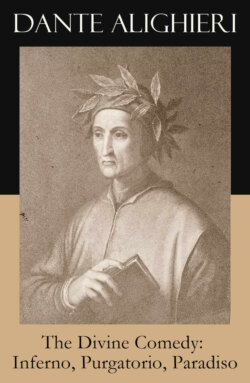Читать книгу The Divine Comedy: Inferno, Purgatorio, Paradiso (3 Classic Unabridged Translations in one eBook: Cary's + Longfellow's + Norton's Translation + Original Illustrations by Gustave Doré) - Dante Alighieri - Страница 78
На сайте Литреса книга снята с продажи.
ОглавлениеAnd o'er my Spirit, that in former days
Within her presence had abode so long,
No shudd'ring terror crept. Mine eyes no more
Had knowledge of her; yet there mov'd from her
A hidden virtue, at whose touch awak'd,
The power of ancient love was strong within me.
No sooner on my vision streaming, smote
The heav'nly influence, which years past, and e'en
In childhood, thrill'd me, than towards Virgil I
Turn'd me to leftward, panting, like a babe,
That flees for refuge to his mother's breast,
If aught have terrified or work'd him woe:
And would have cried: "There is no dram of blood,
That doth not quiver in me. The old flame
Throws out clear tokens of reviving fire:"
But Virgil had bereav'd us of himself,
Virgil, my best-lov'd father; Virgil, he
To whom I gave me up for safety: nor,
All, our prime mother lost, avail'd to save
My undew'd cheeks from blur of soiling tears.
"Dante, weep not, that Virgil leaves thee: nay,
Weep thou not yet: behooves thee feel the edge
Of other sword, and thou shalt weep for that."
As to the prow or stern, some admiral
Paces the deck, inspiriting his crew,
When 'mid the sail-yards all hands ply aloof;
Thus on the left side of the car I saw,
(Turning me at the sound of mine own name,
Which here I am compell'd to register)
The virgin station'd, who before appeared
Veil'd in that festive shower angelical.
Towards me, across the stream, she bent her eyes;
Though from her brow the veil descending, bound
With foliage of Minerva, suffer'd not
That I beheld her clearly; then with act
Full royal, still insulting o'er her thrall,
Added, as one, who speaking keepeth back
The bitterest saying, to conclude the speech:
"Observe me well. I am, in sooth, I am
Beatrice. What! and hast thou deign'd at last
Approach the mountain? knewest not, O man!
Thy happiness is whole?" Down fell mine eyes
On the clear fount, but there, myself espying,
Recoil'd, and sought the greensward: such a weight
Of shame was on my forehead. With a mien
Of that stern majesty, which doth surround
mother's presence to her awe-struck child,
She look'd; a flavour of such bitterness
Was mingled in her pity. There her words
Brake off, and suddenly the angels sang:
"In thee, O gracious Lord, my hope hath been:"
But went no farther than, "Thou Lord, hast set
My feet in ample room." As snow, that lies
Amidst the living rafters on the back
Of Italy congeal'd when drifted high
And closely pil'd by rough Sclavonian blasts,
Breathe but the land whereon no shadow falls,
And straightway melting it distils away,
Like a fire-wasted taper: thus was I,
Without a sigh or tear, or ever these
Did sing, that with the chiming of heav'n's sphere,
Still in their warbling chime: but when the strain
Of dulcet symphony, express'd for me
Their soft compassion, more than could the words
"Virgin, why so consum'st him?" then the ice,
Congeal'd about my bosom, turn'd itself
To spirit and water, and with anguish forth
Gush'd through the lips and eyelids from the heart.
Upon the chariot's right edge still she stood,
Immovable, and thus address'd her words
To those bright semblances with pity touch'd:
"Ye in th' eternal day your vigils keep,
So that nor night nor slumber, with close stealth,
Conveys from you a single step in all
The goings on of life: thence with more heed
I shape mine answer, for his ear intended,
Who there stands weeping, that the sorrow now
May equal the transgression. Not alone
Through operation of the mighty orbs,
That mark each seed to some predestin'd aim,
As with aspect or fortunate or ill
The constellations meet, but through benign
Largess of heav'nly graces, which rain down
From such a height, as mocks our vision, this man
Was in the freshness of his being, such,
So gifted virtually, that in him
All better habits wond'rously had thriv'd.
The more of kindly strength is in the soil,
So much doth evil seed and lack of culture
Mar it the more, and make it run to wildness.
These looks sometime upheld him; for I show'd
My youthful eyes, and led him by their light
In upright walking. Soon as I had reach'd
The threshold of my second age, and chang'd
My mortal for immortal, then he left me,
And gave himself to others. When from flesh
To spirit I had risen, and increase
Of beauty and of virtue circled me,
I was less dear to him, and valued less.
His steps were turn'd into deceitful ways,
Following false images of good, that make
No promise perfect. Nor avail'd me aught
To sue for inspirations, with the which,
I, both in dreams of night, and otherwise,
Did call him back; of them so little reck'd him,
Such depth he fell, that all device was short
Of his preserving, save that he should view
The children of perdition. To this end
I visited the purlieus of the dead:
And one, who hath conducted him thus high,
Receiv'd my supplications urg'd with weeping.
It were a breaking of God's high decree,
If Lethe should be past, and such food tasted
Without the cost of some repentant tear."
